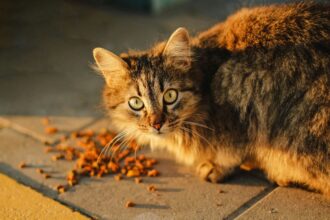As pet owners, we want to give our cats the very best, and that includes ensuring they get the right nutrients to thrive. One nutrient that often comes up in discussions about feline health is Omega-3 fatty acids. While you might have heard of Omega-3 being essential for humans, you may be wondering: Is it really beneficial for cats? Can it help your cat stay healthy and strong? Let’s explore what Omega-3 is, how it benefits your cat, and how to safely incorporate it into their diet.
What is Omega-3 and Why is it Important for Cats?
Omega-3 fatty acids are a type of polyunsaturated fat that is crucial for overall health. While many animals, including humans, can’t produce Omega-3 on their own, it’s essential that we get it through food or supplements. For cats, Omega-3 fatty acids are especially important because they help with a variety of bodily functions, from supporting the immune system to promoting healthy skin and a shiny coat.
In cats, Omega-3s support:
- Heart health: Omega-3s can help maintain healthy heart function and reduce the risk of heart disease in cats, especially as they age.
- Joint health: They help reduce inflammation, which can ease the discomfort of arthritis in senior cats.
- Skin and coat health: Omega-3 helps keep your cat’s skin hydrated and their coat shiny, reducing dryness, itching, and shedding.
- Cognitive function: Omega-3 is also linked to brain health, potentially reducing the risks of cognitive dysfunction as your cat ages.
- Anti-inflammatory benefits: Omega-3s can help manage conditions like food allergies, grain allergies, or even meat allergies, as they help reduce inflammation in the body.
With all these benefits, it’s clear that Omega-3 is an essential part of your cat’s diet, but how do you ensure they’re getting enough?
Natural Sources of Omega-3 for Cats
While Omega-3 is found in many human foods, not all of them are suitable for cats. Cats need a specific form of Omega-3 called EPA (eicosapentaenoic acid) and DHA (docosahexaenoic acid), both of which are primarily found in fish oils.
- Fish Oil: One of the best sources of Omega-3 for cats is fish oil, especially from salmon, sardines, and mackerel. These fish are rich in EPA and DHA, which are the forms of Omega-3 that cats can easily absorb.
- Canned Fish: You can also feed your cat canned fish, like tuna or sardines, although it’s important to choose those that are packed in water, not oil, to avoid unnecessary fats. These fish offer a delicious and natural source of Omega-3.
- Flaxseed Oil: Some plant-based oils, such as flaxseed oil, contain Omega-3, but they provide a form called ALA (alpha-linolenic acid), which cats are not as efficient at converting into EPA and DHA. Therefore, while it can be a supplementary source, it’s not as effective as fish oils.
- Krill Oil: Krill, a tiny crustacean, is another excellent source of Omega-3. It’s often found in supplements designed specifically for cats, offering both EPA and DHA in a form that’s easily digestible.
- Algal Oil: Algae-based oils are becoming more common as a plant-based Omega-3 source. Algal oil can provide a sustainable, vegan-friendly option for pet owners looking for a non-animal source of Omega-3 for their cats.
Omega-3 in Cat Food
If you’re looking for an easy way to incorporate Omega-3 into your cat’s diet, you can start by selecting cat food that already includes it. Many premium brands of dry food and wet food for cats include Omega-3 fatty acids, often from fish oil, to help support your cat’s health. If you’re concerned about allergens or sensitivities, you can opt for grain-free food or organic food, which sometimes include higher-quality fish or alternative protein sources like freeze-dried food or raw food.
Some types of prescription food may also contain Omega-3 fatty acids, particularly for cats with specific health conditions, such as those with sensitive stomachs or food sensitivities.
Dosage of Omega-3 for Cats
How much Omega-3 should your cat be getting? That depends on your cat’s size, age, and health condition. Generally, a high-protein food that includes Omega-3 should provide a sufficient amount for most healthy adult cats.
However, if you’re looking to supplement your cat’s diet with additional Omega-3 (for example, if you want to help with joint health or skin issues), the recommended dosage is usually around 50 to 75 mg of EPA and DHA per kilogram of body weight per day. This can be administered through fish oil supplements, added to their regular food, or given as treats designed to support skin and coat health.
It’s always important to consult with your vet before adding Omega-3 supplements to your cat’s diet, especially if they are on prescription food or have any health conditions. Your vet can help determine the right dosage for your cat based on their specific needs.
Risks of Too Much Omega-3
While Omega-3 is generally safe for cats, it’s possible to overdo it. Too much Omega-3 can lead to an upset stomach, diarrhea, or even weight gain if your cat’s diet becomes unbalanced. If you’re considering supplementing Omega-3, it’s crucial to keep track of the total amount of Omega-3 your cat is getting from both food and any added supplements to avoid potential issues.
Additionally, cats with certain health conditions, such as food intolerance or immune system issues, may need to avoid high doses of Omega-3. Always check with your vet before making any changes to your cat’s diet.
Omega-3 and Specific Cat Needs
Omega-3 benefits can vary depending on your cat’s stage of life or health condition. Let’s look at how Omega-3 can support specific types of cats:
- Kittens: Omega-3 is important for brain development and growth in kittens. It helps their nervous system mature, supporting cognitive function and vision development.
- Senior Cats: Omega-3 fatty acids help reduce inflammation in older cats, easing the symptoms of arthritis and improving joint health. It can also help protect against cognitive decline, keeping your senior cat sharp.
- Weight Management: If your cat needs to lose weight, Omega-3s can help by promoting fat metabolism and reducing fat storage. Omega-3s also help improve the overall quality of your cat’s diet by supporting skin health and reducing inflammation.
- Cats with Sensitive Stomachs: Omega-3 can help soothe digestive issues, reducing inflammation in the stomach lining and helping with food sensitivities.
Omega-3 Supplements and Treats
If you want to ensure your cat gets enough Omega-3, there are many Omega-3-rich treats and supplements available. Some treats are designed specifically to help with skin, coat, and joint health, while supplements can be added directly to your cat’s food. Whether you opt for training treats or interactive toys that also support Omega-3 intake, there’s an easy way to make sure your cat is getting their essential fatty acids.
Conclusion: Omega-3 for Cats is a Must-Have Nutrient
Incorporating Omega-3 into your cat’s diet is a fantastic way to support their overall health, from heart and joint health to maintaining a shiny coat. Whether you choose to provide it through fish oil, high-protein food, or supplements, Omega-3 is a nutrient that can make a significant difference in your cat’s well-being.
Before adding Omega-3 supplements or changing your cat’s diet, it’s always best to consult with your vet to ensure you’re providing the right amount for their needs. By focusing on the right sources and dosage, you’ll be helping your cat live a long, healthy, and happy life.







